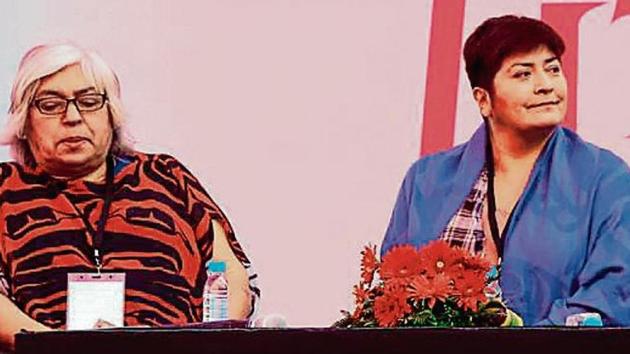The pain of being oppressed is constant, chronic, says Columpa Bobb at Chandigarh Literati
Maracle, who has taught at University of Toronto, feels education cannot be separate because then we cannot be together.
“I come as a humble guest to your territory,” said Columpa C Bobb, Salish playwright-poet and ‘myth maker’. All the way from Canada, Bobb was in the city at Chandigarh Literati 2017 for the session ‘Roots and wings’ on Sunday.

She was here with her mother and award-winning author Lee Maracle. Maracle is a Canadian First Nations Coast Salish writer and is a foremost critic of the treatment of indigenous peoples, highlighting issues related to treatment of indigenous women.
Land or territory is supreme in the lives of indigenous peoples whose culture and way of life is deeply tied with nature and in turn ‘Mother Earth’ through stories that have been passed down through generations. The mother-daughter duo believes the world needs their stories to cure the “global mess” we are in.
“I am a creator of myth. We are encouraged to hear stories of our ancestors and think what we’ve learnt from them to mark my time in this space with creativity.”
Bobb practices her art by fusing the structure of the oral tradition of her people with western techniques of theatre, but never compromising on authenticity.
Maracle and Bobb engaged the audience with traditional stories. As storytellers do, they brought their views alive on stage by singing their folk tunes and telling the audience that only the celebration of life can bring us together to move ahead as one.
Maracle said, “We have been here before, experienced mass extinction. If we don’t smarten up, the Earth will cover us with ice and make us start all over again. We’re not natural environmentalists, but we know our stories.”
‘Argument not the way’
For Maracle, the oppressors need to understand their way of life to enable togetherness which is the biggest challenge.
“The question that we think about is how we will do this so that they understand. A single understanding is my major concern. Until we get that and strengthen ourselves, there’s no point arguing,” she added.
The beauty lies in the belief that the colonisers need to decolonise their minds for the good of all. Argument is not the way, exploration is.
Bobb said, “Part of the problem is that colonisation has not stopped. The pain of being oppressed is constant and chronic. But we need to think about what will benefit us. The colonisers think they’re closer to democracy. But, they brought in oppression. Our job is to define humanity and that’s the legacy we must inherit.”
Christopher Gibbins, consul general for Canada in Chandigarh, was the moderator at the session and read out parts of Maracle’s book in which she says, ‘Sharing space and time is the opposite of racism’.
“Wherever we go, we must go together. I love jellyfish in that regard. They have no brain cells. Can you imagine? But when met with a squid, they quickly collaborate and attack together. It’s beautiful to watch.”
‘Don’t know how people define indigenous’
Maracle said, “Talk to Canada about what the term means. The only time I use it is when I ball up all the natives in this part of the world. I, on the other hand, am a river always moving towards the ocean. We’ve been on this land for 15,000 years. Everyone else is pretty much a new arrival.”
Identification from a certain piece of land defines indigenous, as does adopting the ways of the land.
Bobb said, “The Canadians couldn’t kill us, so now they’re trying to legislate us out of existence. We’ve never known a time that we’ve not felt taken away in our own land.”
‘Education can’t separate’
The system of reservations and separate schooling has largely affected the chances of natives to compete with others in the outside world. “We had access to proper education that might give us the chance to compete with other White people. Even inside this colonial educational framework, we realise that our children need to learn our way of life. But the real struggle is whether we keep our school of thought or adopt their ways or invite them in.”
Maracle, who has taught at University of Toronto, feels education cannot be separate because then we cannot be together.
“We’re all family, we’re all the same. First, we come together and then decide what to learn from each other.”





